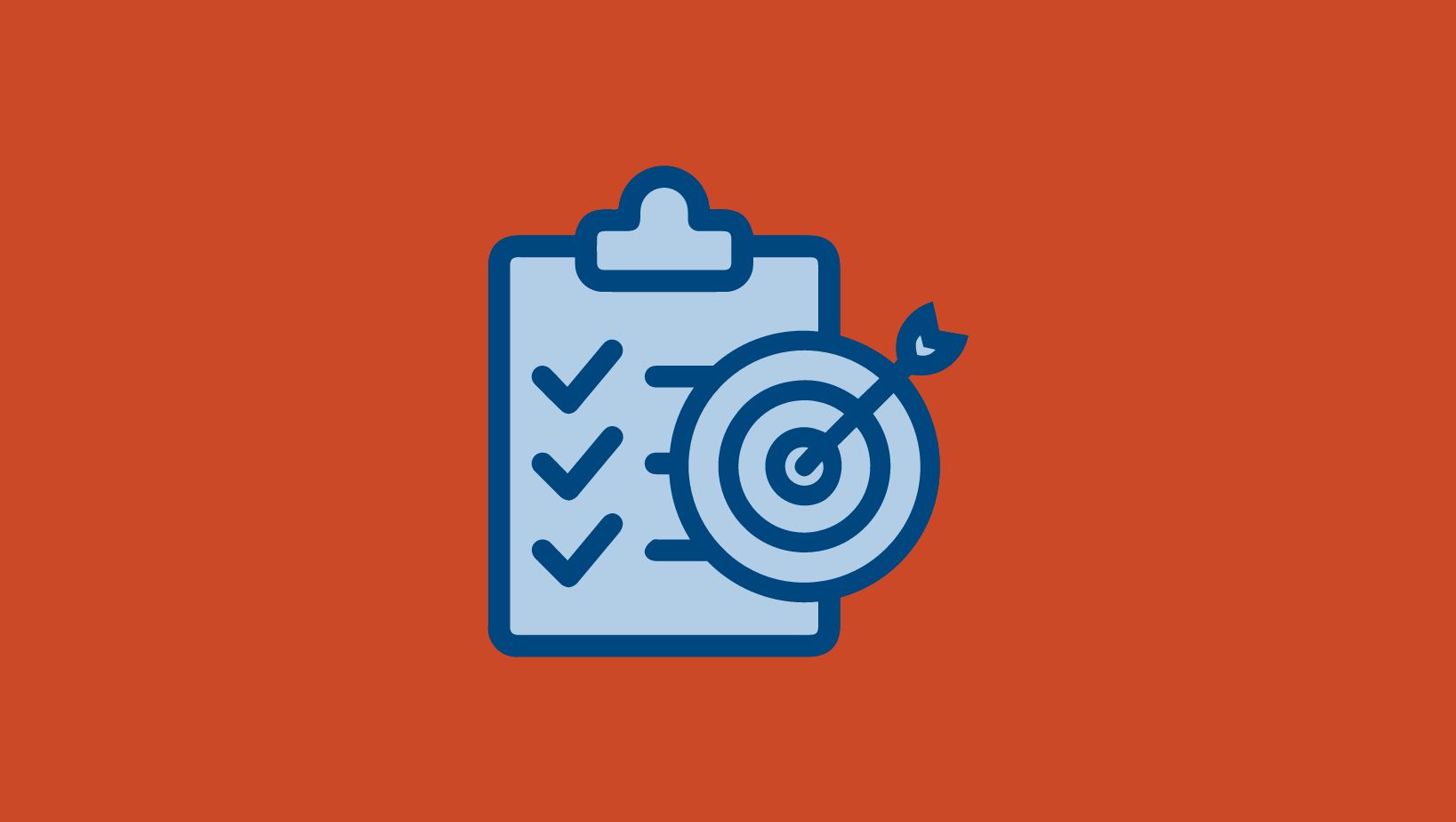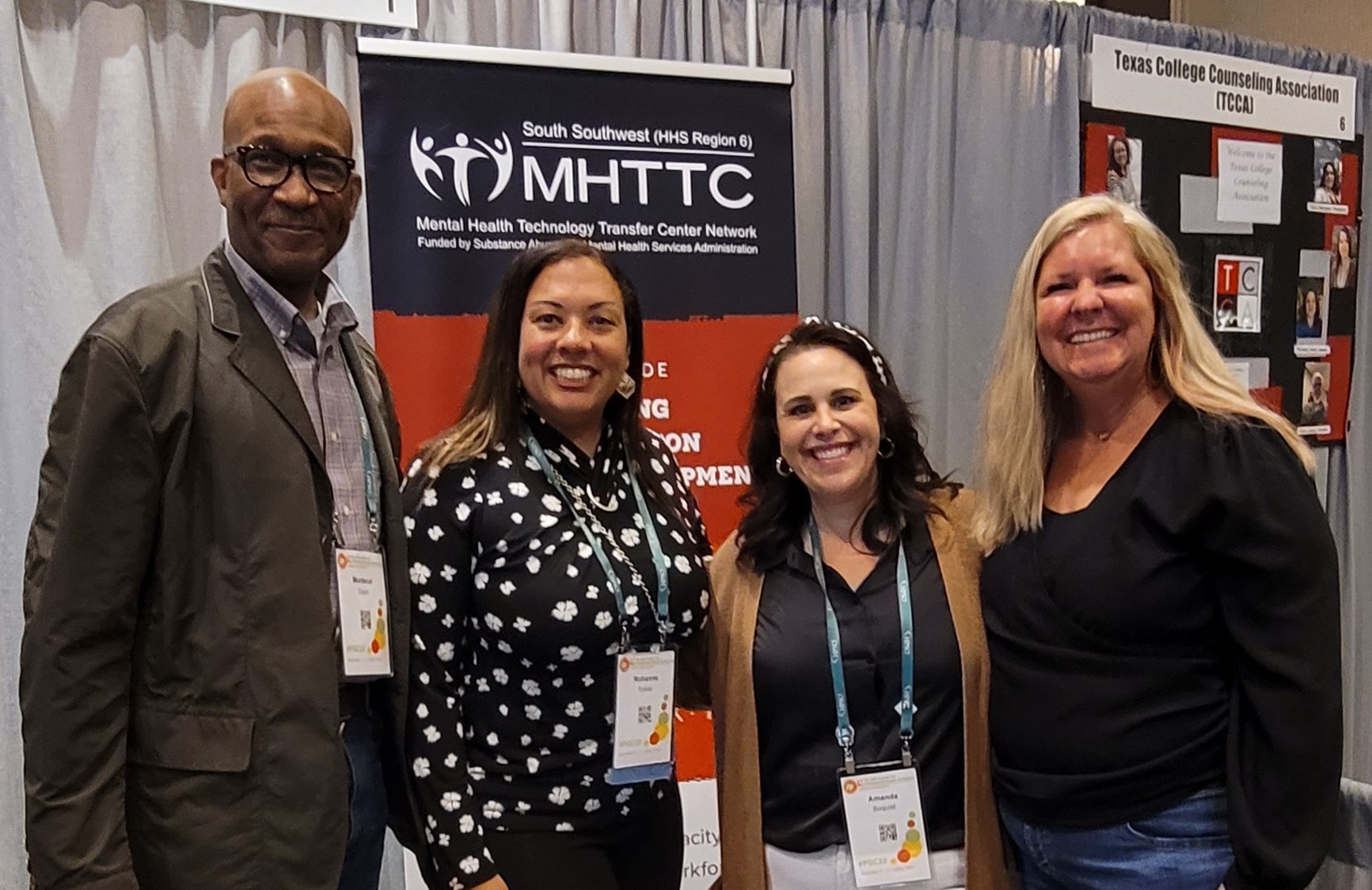Home > Setting Career Development Goals: A Guide for Mental Health Professionals in the New Year
By: Raven Garza (she/they)

Happy New Year! We hope everyone had time to rest and reset over the holidays. If you’re thinking about adding some professional learning goals to your 2024 plan, we want to help simplify that process.
You’ve probably noticed by now that the behavioral and mental health space is constantly changing. Many roles require recertifications or updated training every few years, and it can be difficult to keep up with all of the new research being published.
In this blog, we’ll share key tips on creating realistic goals, self-care practices to support your progress, and educational resources to expect from our South Southwest Mental Health Technology Transfer Center Network (MHTTC) team in the coming months.
What exactly is a realistic goal? It’s something that you can accomplish given your current mindset, motivation, timeframe, skills, and abilities. While we encourage everyone to have ambitious goals, it’s important to recognize what you can practically achieve.
Here are a few tips to maximize your time and resources (and stay confident).
Spend some time reflecting on your values, interests, strengths, and any existing gaps in training/certifications related to your position.
Is there a topic you’ve been meaning to learn more about? Did you make progress in 2023 that you can build on this year? Do you want to continue down your current career path, or are you aiming to switch to a different role within the mental health industry?
Write down your goals as clearly as possible. You can also point out whether the goal is short-term or long-term.
Take note of the things you have access to that can help you achieve your goals and any roadblocks you might encounter. We suggest thinking about:
Time: How much time do you have to complete your goal? Are there any deadlines you have to meet? Consider any tasks or commitments that could compete for your time or conflict with your progress.
Preparation & training: Do you have all the background information needed to reach your goals? Double-check for any additional prerequisites or skills that you might need to meet your goals.
Money: Will any of your goals require fees, tuition, or other financial responsibilities? Determine whether you should modify your budget or look for more affordable alternatives.
Support: Are there experienced professionals in your network who you can connect with? It’s useful to have a trustworthy group of people to lean on— whether you need feedback, mentorship, or advice.
After you’ve thought about your resources and obstacles, you can revisit your goals and make adjustments if necessary.
For example, if your goal is "I will improve my knowledge of trauma-informed care by earning a certification from the South Southwest MHTTC" but you notice that the class requires a few introductory sessions, you could change your goal to "I will complete two introductory courses on trauma-informed care within the next three months so I can register to become certified by summertime."
Accomplishing your professional goals is a process, and having smaller objectives along the way can help keep you on track. Creating these segments makes your goal seem much more manageable and allows you to celebrate small wins. Don’t worry about missing a milestone or two— take it as a sign to rework your original schedule.
For example, if you expect to meet a goal in five months, set reminders to check your progress every two to three weeks. If you start falling behind, either give yourself a little more time to complete the goal or adjust your tasks.
Telling people in your life about your career goals is beneficial because they can hold you accountable throughout your learning journey. You can let your family, friends, or colleagues know that simply checking in and asking about your progress can be a subtle push to stay focused.
If you want to make your goals more structured, use the SMART criteria:
Specific
Measurable
Achievable
Relevant
Time-bound
The SMART acronym is a framework that enables you to set more impactful goals. By applying these elements to your list, you can easily quantify your progress and understand what you still need to complete.
Yes, even mental health professionals could use this reminder: Your mental and emotional well-being matters. Maintaining a healthy work-life balance is essential for long-term success.
Let’s dive into a few self-care tips.

Here are some ways you can build resilience, prevent burnout, and create a sustainable foundation for achieving your career goals.
Know your boundaries: It’s great to feel motivated about meeting your professional goals but remember to set clear boundaries between work and personal life. Avoid overcommitting and make time for relaxation, socializing, and fun hobbies.
Add mindfulness techniques to your routine: You can try taking a few minutes from your busy day to meditate, journal about your week, or focus your attention on other thoughts, objects, and sensations.
Be kind to your body: Make sure you get enough quality sleep, take regular breaks from technology, let your mind fully decompress during vacations, and set time for gentle movements/exercise during the workday.
Optimize your workspace: On top of keeping your office/desk tidy, consider putting up pictures or art that inspires you. Your workspace should feel like a reflection of your best self.
Ask for help when you need it: Don’t hesitate to reach out to someone you trust if you feel overwhelmed with stress or discouraged about being able to meet your goals.

We’ve collected upcoming trainings, events, and other learning opportunities that you should know about. If you’re interested in a session that doesn’t have a registration link yet, feel free to email [email protected] for more information!
Virtual learning platform (free to sign up)
HealtheKnowledge is an online platform with over 270 free and low-cost courses for health and behavioral health professionals. Our team created a three-hour, three-session course about trauma-informed care basics on HealtheKnowledge that comes with a certificate of completion.
Interactive booklet
Positionality refers to the social positions we hold in our society that influence how we interact with the world. This project aims to provide resources for the mental health workforce to understand and integrate positionality into their work. The booklet includes foundational information for providers, researchers, and advocates to understand positionality.
January 10 | Virtual
An insightful session on the relationship between empathy and healthy peer dynamics. This session explains key research findings and provides concrete ideas for project-based and experiential learning to decrease peer aggression and promote intervening behaviors from bystanders.
January 29-31 | Virtual
Peer specialists from across region 6 are invited to apply for the Youth and Young Adult Peer Specialist training. These sessions were developed to train peer supporters on the topics of youth voice and issues specific to youth navigating mental health or substance use challenges.
January 30-March 19 | Virtual + In-person (optional)
This is an eight-session online course that also includes an optional retreat. Participants who attend all eight sessions will receive CEUs. This training is designed for educators, caregivers, and those who work in service of young people.
Premiered in January 2024
We hear a lot of discourse in human service organizations about the need to create authentic and sustainable trauma-informed cultures. If you’re interested in exploring the issues of workplace culture and trauma, we hope you’ll tune in. Listen to the first season if you haven’t already, and sign up to be notified about new episodes from Season 2 (where we dive into mindful self-compassion).
February 13 | Virtual
This presentation will help mental health and substance use providers, as well as the recovery community at large, better understand the needs of people with IDD (intellectual and developmental disabilities) and how to address them.
February 13 | Virtual
Professionals in the early childhood mental and behavioral health field are invited to learn about ASQ-3™ and ASQ:SE-2™, two important developmental screening tools widely used in all child-serving settings. Certified trainer Holly Gursslin M.Ed, NCC, LPC will help attendees gain the practical skills needed to identify developmental and social-emotional needs in young children.
February 2024 | Virtual
A three-session series for school professionals that addresses trafficking and trauma responsiveness. Finalized dates coming soon.
April 25 | Virtual
When it comes to peer harassment, administrators have to make difficult decisions both online and offline. This session will equip these point personnel with the knowledge they need to act through exercises based on real-world examples and research-based best practices that continue to evolve.
June 5-6 | Virtual
We invite those committed to transforming FEP care (including providers, researchers, and those with lived experience) to join us at this year’s conference titled Pausing with Purpose: Guiding FEP Care with Human Connection.
We hope this helps start your year off on a high note. Remember that career goals and aspirations may evolve, and the process isn’t always linear.
If you want to be the first to know about learning opportunities and resources, subscribe to our newsletter!
 Raven Garza (she/they) is a Content Writer for the Texas Institute for Excellence in Mental Health (TIEMH) and graduated from UT Austin with a BA in English Literature.
Raven Garza (she/they) is a Content Writer for the Texas Institute for Excellence in Mental Health (TIEMH) and graduated from UT Austin with a BA in English Literature.
Raven is passionate about mental health advocacy and volunteers for non-profits that support youth and people of color. In their free time, they love going to live shows around Austin, reading manga, writing about Latine culture + queer experiences, and taking solo trips around the world.